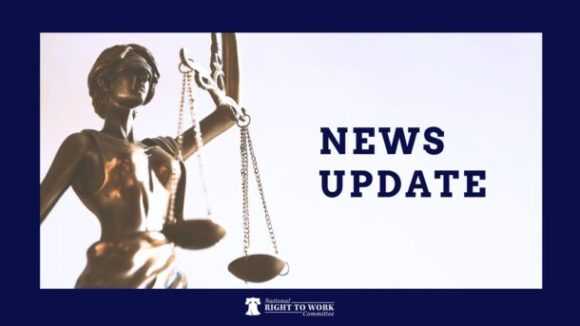Will Team Biden Weaponize Workers’ Pensions?
Big Labor abuse of worker pension and benefit funds as a means of advancing union bosses’ self-aggrandizing policy objectives is a familiar phenomenon.
Washington, DC (June 21, 2021) – Staff attorneys from the National Right to Work Legal Defense Foundation have just submitted petitions for writ of certiorari in two class-action civil rights cases seeking to enforce workers’ First Amendment rights. In both cases public educators are challenging union boss-created restrictions on their First Amendment right to refrain from funding unwanted union hierarchies in their workplaces. One petition was filed for Chicago Public Schools educators Joanne Troesch and Ifeoma Nkemdi, whose lawsuit against the Chicago Teachers Union (CTU) and the Chicago Board of Education challenges a union boss-created “escape period” scheme that blocks workers from exercising their right to terminate dues deductions from their paychecks outside the month of August.
The second petition was filed in a lawsuit brought by New Jersey teachers Susan Fischer and Jeanette Speck, who are suing the New Jersey Education Association (NJEA) union for enforcing a similar annual window that restricts employees in the exercise of their Janus rights to just 10 days annually, less than 3% of the year.
Both lawsuits argue that these union dues “escape periods” run afoul of the U.S. Supreme Court’s landmark ruling in Janus v. AFSCME, which was won by Foundation staff attorneys in 2018. In Janus, the court ruled that no public worker can be forced to pay union dues or fees as a condition of keeping his or her job. The Court further held that union bosses contravene the First Amendment if they seize any money from an employee’s paycheck without an affirmative consent and a knowing waiver of that employee’s First Amendment rights.
Fischer and Speck, who both work in Ocean Township, NJ, attempted to exercise their Janus rights in July 2018, just a month after the High Court handed down the Janus decision. But Township officials told the teachers they could only stop payments and withdraw their memberships during an annual 10-day window. Unbeknownst to them, union partisans in the New Jersey legislature had actually established that “escape period” by law in May 2018 in an apparent attempt to defang the pending Janus decision.
Fischer and Speck’s suit argues that because the Janus ruling gave public employees the First Amendment right not to financially support union activities, the New Jersey law is unconstitutional and must be nixed. In addition to eliminating the “escape period” scheme, they seek a refund of membership dues for themselves and all other public employees who were blocked by NJEA officials from stopping dues deductions following Janus.
Nkemdi and Troesch’s original lawsuit explains that both educators “did not know they had a constitutional right not to financially support” the union hierarchy until the fall of 2019, when they discovered their Janus rights while looking for information on how to continue working during a strike that CTU bosses ordered that October. They sent letters the same month to CTU officials to exercise their Janus right to resign union membership and cut off all dues deductions.
Both educators received no response until November of that year, when CTU officials confirmed receipt of the letters but said that they would continue to seize dues from the teachers’ paychecks “until September 1, 2020,” as per the union’s “escape period” scheme. Troesch and Nkemdi demanded in their lawsuit that CTU union officials and the Board of Education stop enforcing the “escape period,” notify all bargaining unit employees that they can end dues deductions any time, and permit bargaining unit employees to claim back dues that were already seized without their consent.
“‘Escape periods’ like those forced on Troesch, Nkemdi, Fischer, and Speck serve no purpose other than to keep the hard-earned cash of public servants who oppose union officials’ so-called ‘representation’ flowing into union coffers even after those employees have clearly exercised their First Amendment right to object to such payments,” commented National Right to Work Foundation President Mark Mix. “With opposition to these schemes growing among public employees, the Supreme Court must quickly take up this issue and clarify that Janus does not permit union bosses to profit from curtailing workers’ constitutional rights.”
If you have questions about whether union officials are violating your rights, contact the Foundation for free help. To take action by supporting The National Right to Work Committee and fueling the fight against Forced Unionism, click here to donate now.

Big Labor abuse of worker pension and benefit funds as a means of advancing union bosses’ self-aggrandizing policy objectives is a familiar phenomenon.

What impact does handing a union monopoly power to deal with your employer on matters concerning your pay, benefits, and work rules have on your pay?

The Foundation’s brief before the High Court in Starbucks v. McKinney discusses how NLRB officials use this radical assumption to urge federal courts to hit employers with “10(j) injunctions” that coerce the employers to give into certain union-demanded behavior.